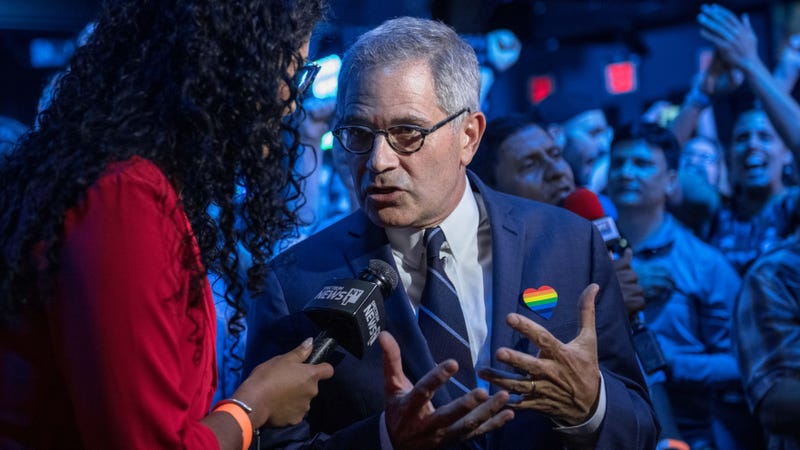
The primary election for Philadelphia district attorney comes May 18. Tonight at 7 p.m., you can listen to a live debate between incumbent Larry Krasner, who is profiled below, and challenger Carlos Vega, whose profile you can read by clicking here. Listen on 103.9 FM or 1060 AM, on the Audacy app, or on your smart speaker.
PHILADELPHIA (KYW Newsradio) — Philadelphia District Attorney Larry Krasner began his legal career as a public defender, before starting his own civil rights law firm where he spent 25 years.
His firm was most known for suing police officers.
“I never thought about running for office in any serious way until the last election cycle,” Krasner said.
At age 56, the St. Louis native who came to Philly as a kid decided to run for office when President Donald Trump won the White House.
“During my entire career of 30 years, the system just got worse and worse and worse," he said.
"It was like watching a slow motion car crash, to be honest with you.”
Krasner said he wanted to make a bigger impact in the work he was doing for his clients, and he was backed by a progressive reform movement.
“This was coming from people who profoundly want change from all over the country,” he said.
Like other progressive district attorneys across the country in cities like Los Angeles and Baltimore, Krasner has described his focus as ending mass incarceration and mass supervision.
He added that his goal was to shift priorities of what to prosecute: Not charging low-level offenses which keep people in prison, and instead shifting to more serious crimes.
“We cut mass incarceration by half, and we cut future years of supervision by two-thirds,” Krasner says.
He also said he is proud of his special investigation unit, which has charged more than two dozen police officers.
“It’s a sea change when it comes to holding police accountable,” he said.
“There has to be police accountability if we are going to rebuild trust with communities, and there has to be prosecutorial accountability if we are going to rebuild trust with communities.”
Krasner also noted the Conviction Integrity Unit, which has exonerated 19 people in 20 cases over the last three-and-a-half years.
But Krasner shared he is also proud of the work his office has done in protecting immigrant victims, witnesses and workers, and in supporting victims through policy changes and his CARES program.
Though he realizes his reform policies have been heavily criticized, he said 10% of the country wants progressive prosecutors. He attributes that percentage to how many cities have elected progressive prosecutors.
If re-elected, he said he will maintain the course of reform, even if it causes a rift with other criminal justice partners.
“You look at what’s happening, you look at metrics all the time. You try to figure out where there are problems, including in our office. You try to adjust, to deal with those problems," said Krasner.
"If your partners work with you, great. If they don’t work with you, and you still see a pathway to do it, you do it in your own way."
As gun violence continues to rise, Krasner said moving forward, he wants to adopt a version of the CURE Violence program. It takes a public health epidemic approach to gun violence by intervening in potential conflicts or anticipated shootings, while seeking resolutions and keeping tabs with each issue.
“There is a form of it in Philly, but there is a form I would modify a little bit,” he said.
Krasner described how his office has been working with police, gathering more solid evidence in gun crime cases. He has also added prosecutors to police divisions and the intelligence center, which he says accelerates the case and investigation.
He said he plans more, if re-elected.
“To me, it’s not like you stop adjusting things. You look at what’s happening, especially when you have a caseload that is literally going to be doubled by the time you get out of this pandemic,” he said.
Krasner believes prevention is the key to ending the gun violence crisis.
“Our vision has always been to prevent the next victimization,” he said, adding that it’s for both a victim and someone caught in the system.
“Sometimes that means jail. Sometimes that means diversion. There has to be more than one gear on this car.”




